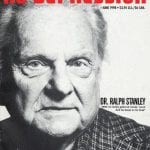Johnny Bush – Horse Opera
DW: Sometimes it takes them awhile. They’ve got to get loosened up, especially if you’re playing for a bunch that’s just eaten.
JB: Their attitude I think has a lot to do with ours. If we’re having a good time, they seem to have a good time. But if you hit the bandstand with an attitude about, “Well, this is a job and it’s 8 o’clock, so let’s do it,” they pick up on that.
ND: Do you ever get any line dancers?
JB: The closest thing to a line dance we do is the “Cotton-Eyed Joe”, and that’s the way I want to keep it.
DW: I always tell the folks at a new place that we don’t do nothing but strictly Top 40 country — 40 years old. We don’t do no “Achy-Breaky Heart” or “Boot-Scootin’ Boogie”. If you can find anything that we do to line dance to, it’s got to be an accident.
ND: Johnny, your new album is going to introduce you to an audience that may not be familiar with your stuff from the ’60s and ’70s, and maybe only knows you from “Whiskey River”.
JB: Well, my audience today, kids come up and ask for a song I cut 30 years ago, it seems like that long anyway, called “Green Snakes On The Ceiling”. I hated it then, and I hate it now. But I’m sure thankful that they ask for it.
DW: And they’ll ask me for it. Almost every night we play, someone wants to hear “Green Snakes”.
JB: Bobby Bare once said to me that he’d never cut another song he didn’t like personally. Because with his luck it would hit, and he’d have to sing it the rest of his life. And that’s how I feel about “Green Snakes”. I’m more of a ballad singer.
ND: How about “Whiskey River”. Is that something you still like?
JB: Oh, Lord, yes.
DW: Did you write that, or did Willie?
JB: I wrote it.
DW: I thought you did.
JB: He’s cut it nine different times now. A disc jockey at WSM, while we were on the air, he said, “Well, John, you think he’ll ever learn to sing it right?” And I said, “I hope not.” Every 90 days I get a nice check from his version of it. What’s weird about the record business is that I had a Top Ten song with it, his never even got into the Top Ten, but his version has outsold mine a million to one. So much for charts. The one thing about charts, they’re printed on very soft paper, and you can take ’em into the bathroom with you.
ND: For those who are hearing you for the first time now, how is your voice different than it was on your hits of the ’60s and ’70s?
JB: Well, it’s a lot older. I don’t sing as high as I used to. I just can’t get there. But I’ve noticed that Price has lowered his keys. I guess when you get older, your vocal cords stretch like guitar strings, and you lose a little of that elasticity. Of course, Don sings in a falsetto, which is totally different, hitting a note an octave higher.




